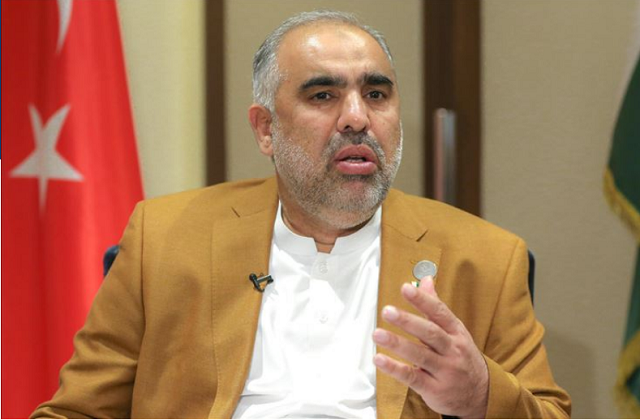Islamabad:
Pakistan Tehreek-e-insaf (PTI) admitted on Sunday that the granting of an extension of service to former army chief (RETD) Qamar Javed Bajwa was a mistake, apologizing to the Nation for the decision and promising never to be part of these practices.
Admission and apology came from the management of the PTI and former president of the National Assembly Asad Qaiser during a joint press conference in Tehreek Tahafuz Aain Pakistan (TTAP) in Islamabad.
“The decision concerning the extension of Bajwa was wrong; I think it was our historically incorrect decision,” said Qaiser, answering a question about the extension of the former Coas. “We apologize to the whole nation [on this decision]”He added.” We will not be part of such a decision in the future. “”
The head of the TTAP and a veteran Politician Mahmood Khan Achakzai added that no civilian civil servant or military official should be granted service extensions, arguing that the appointments should be made solely on merit-the only principle, he said, essential to the progress of Pakistan.
At the end of 2019, Pakistan faced an unprecedented legal confrontation at that time – the decision of Prime Minister Imran Khan to grant a three -year extension to General Bajwa, whose mandate was to end on November 28. Barely two days before its date of retirement, the Supreme Court suspended the extension while hearing a petition which disputed it – the first case in the history of the country.
The government had justified the extension by citing regional security problems, in particular the revocation of India for the autonomy of cashmere and the role of Pakistan in the American-Afghan peace process. Critics, however, considered him as a political calculation to guarantee Khan’s mandate, given the perceived role of the army in the facilitation of his ascent to power.
During his remarks, Qaiser not only criticized the outgoing governance model, but also described it as “illegal, unconstitutional and anti -democratic”, affirming that the country was under a “practical martial law” where decisions were taken under institutional rather than merit.
The pillar of the PTI said that his party thought that cases of political prisoners, including the founder of the Imran Khan party, should be heard on merit and without external influence, adding that the media coverage live from the trials would expose the reality of the procedure.
In the so -called 27th constitutional amendment, Qaiser said that PTI would use all forums available – Parliament, courts and public mobilization – to resist it, adding that the movement of a lawyer would also be launched.
He said the party would tackle legal fraternity to contest such a decision, start consultations with the Islamabad bar this month, engage with foreign diplomats and organize seminars to highlight its concerns.
Achakzai, speaking at the same press conference, stressed that the TTAP movement would avoid personal attacks and focus on constitutional protection, adding that political differences should not undermine democratic principles.
He remembers visiting PML-N Supremo Nawaz Sharif and his daughter Maryam Nawaz during their imprisonment in the past, noting that “party leaders would visit them in herds and that no one would oppose it”.
Shouting the political and governance decline of Pakistan, Achakzai warned that when the audience of the public increases, even the most rooted leaders can be deleted.
He called for a political agreement to ensure the supremacy of the Constitution, judicial independence, the creation of a credible electoral commission, media freedom and the end of the harassment of journalists – affirming that all parties should sign such a document.
The former leader of the PML-N and Governor of Sindh, Muhammad Zubair, also addressed the rally, highlighting the country’s in-depth economic crisis. He cited record inflation – weekly price increases affecting 50% and overall inflation reaching 38% – saying that such levels had never been seen before in Pakistan.
Zubair said that more than 110 million people had fallen below the poverty line, overall unemployment at 22% and youth unemployment at 30%. He underlined a strong increase in public debt, noting that if PTI’s mandate has increased by RS19 Billions, the last three and a half years had added Rs38 Billions more.
Foreign investment, he said, was now a 50-year-old low despite the promises of major dishes. It noted a drop in GDP growth to an average of 1.62% against a population growth rate of 2.6%, in parallel with a 60% drop in purchasing power over three years.
Calling the state of “shameful” education, it cited 27 million children outside and malnutrition affecting 40% of children. Companies in the public sector, he added, underwent losses of 1 Billion of rupees, which put more national finances.




